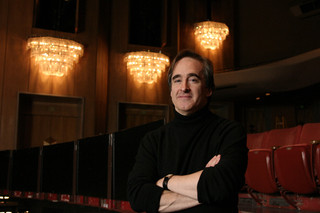|
Back
The Replacements Chicago
Orchestra Hall, Chicago Symphony Center
03/30/2017 - and March 31*, April 1, 2017
Franz Schubert: Symphony No. 8 in B Minor, “Unfinished”, D. 759
Gustav Mahler: Das Lied von der Erde
Sarah Connolly (mezzo-soprano), Stephen Gould/Richard Cox* (tenor)
Chicago Symphony Orchestra, James Conlon (conductor) 
J. Conlon (© Robert Millard)
The Chicago Symphony Orchestra’s planned roster for Das Lied von der Erde was apparently star-crossed. Bernard Haitink withdrew with ample notice for James Conlon to lead rehearsals, while scheduled tenor Stephen Gould withdrew after the first of three performances. Haitink fans, excited for the storied Mahlerian to lead one of the composer’s most monumental creations, were surely saddened by the news, but Conlon’s readings of both works were satisfying if not enlightening.
Conlon led a polite reading of Schubert’s two-movement symphony. For all his poetic gestures on the podium, there was a lack of passion and momentum, especially in the first movement. As the second subject searched in vain for its cadence and suddenly broke off, unfinished, Conlon slowed the tempo to a snail’s pace, which got even slower for the orchestra’s two rebuffs. This was followed by a sudden accelerando back to the initial, faster-than-usual tempo that, at the symphony’s outset, promised excitement that never really materialized. Temporal fussiness pervaded the performance.
The superlative orchestral playing easily counterbalanced such mannerisms from the podium. Schubert’s subtly imaginative orchestration–from the otherworldly oboe and clarinet unison of the first subject to the deep, dark double bass C that initiates the development–brought a rainbow of colors from the players. In the second movement, Alex Klein and Stephen Williamson, principal oboe and clarinet, were ethereal in their solos, projecting a perfect sense of nostalgia. If Conlon would have let the trombones and timpani add a bit more bite to their more forceful passages, the performance would have gone from satisfying to exhilarating.
Das Lied von der Erde has, by its very nature, more opportunity to exhilarate, and overall the performance was more engaging and engaged than the Schubert. Richard Cox deserves endless applause for stepping in for this summit of the repertoire on very short notice. He has an attractive voice and gave a passionate, knowing account of the piece, but the part simply extends too high for him. This was most noticeable at the climax of “Das Trinklied vom Jammer der Erde” (“Hört ihr, wie sein Heulen hinausgellt...” was barely audible), but became less of an issue in his second and third songs.
Sarah Connolly deftly created a dynamic character in “Der Einsame im Herbst,” her velvety voice becoming robust and impassioned as the song progressed. Like Cox, she lacked the last ounce of carrying power to fully convince in “Von der Schönheit,” but her singing in “Der Abschied” was captivating from start to finish.
Conlon’s depth as an opera conductor was more helpful in the Mahler, and he seemed less concerned with pushing and pulling the tempos further than the score indicates. The orchestra was resplendent throughout. Klein and Williamson were again excellent, joined by spot-on horn playing from Daniel Gingrich. Mahler’s colorful additions–especially celesta and mandolin in the finale–were highlighted, and contributed to the success of the reading.
Marcus Karl Maroney
|